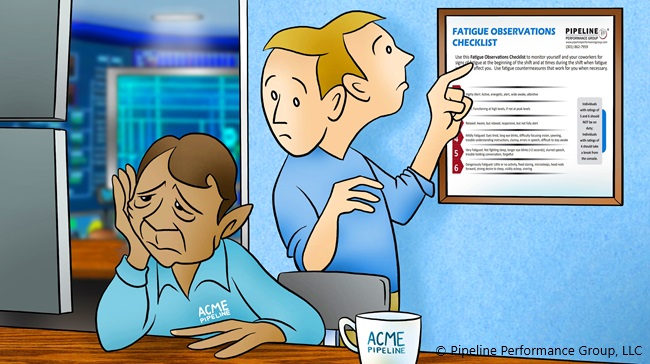Experts recommend that adults get between 7 and 9 hours of sleep each night, but most shift workers sleep less than 6 hours per day on workdays. From our Human Factors research with over 2000 Controllers, a little more than half (56%) report that their schedule does not impact their level of fatigue. But we know the stress of working on the pipeline and the requirements of working long hours and rotating shifts contribute to fatigue. How can you recognize signs of oncoming fatigue? That may be more difficult than you think. In this article, we revisit the tireless question – how do we recognize the signs of fatigue?
Sleep deprivation is a surefire way of becoming fatigued. Achieving 8 hours of quality, recharging sleep each night requires discipline. Most pipeliners work a 12 hour shift, commute to and from work, and then schedule 8 hours for sleep. In a 24 hour period, that leaves less than 4 hours of awake free time. Most of us feel that we need more than 4 hours per day to attend to our personal priorities, like mowing the lawn, buying groceries, cooking a meal, playing with the kids, and enjoying the company of friends. When we spend more time awake, we cut into our sleeping time, sometimes reducing our sleep time from 8 hours to 6, or even 4! Being deprived of a solid 8 hours of sleep each night means that by the end of the week, we are exhausted! Are you getting enough sleep each night?
Sleep deprivation is not the only source of fatigue. For example, you may be getting a solid 8 hours of sleep each night, but you carry heavy machinery on the pipeline. Although you are getting enough sleep, the pure physicality of your job may create fatigue. Tired muscles may lead to a tired mind. In another example, perhaps you are in the control room crunching numbers all day, entering data, monitoring multiple pump stations, managing deliveries for a busy terminal, and shouldering a lot of responsibility. Regardless of achieving 8 hours of sleep, all of this can contribute to mental fatigue.
There are some subtle and not-so-subtle signs that someone may be suffering under the strains of fatigue. Irritability, grumpiness at work and/or home, making small mistakes at work, being absent-minded, and neglecting or forgetting routine protocols may all be signs that you are not getting your required quota of sleep.
Last month, we shared our Fatigue Observations Checklist. A rating of ‘1’ means an individual is highly alert, active, energetic, wide awake, and attentive. A rating of ‘2’ means they are alert, and functioning at high levels, if not at peak levels. A rating of ‘3’ means they are relaxed, aware, responsive, but not fully alert. A rating of ‘4’ means they are mildly fatigued, with tired eyes, long eye blinks, difficulty focusing vision, yawning, trouble understanding instructions, or clumsy. A rating of ‘5’ means they are very fatigued, fighting sleep with longer eye blinks or slurred speech, being forgetful or having trouble holding a conversation. A rating of ‘6’ is a red-alert – dangerously fatigued with fixed staring, experiencing microsleeps, head nodding forward, the strong desire to sleep, or asleep. Individuals with ratings of 5 or 6 should not be on duty, and those with a rating of 4 should take a break from the console or their assignment in the field.
Fatigue can be brought on in many ways. Whether sleep deprived, physically tired, or mentally tired, fatigue can lead to mistakes. And on the pipeline, mistakes are potentially dangerous for yourself and others. Remember, there is no comparable chemical test for identifying the presence of fatigue as there is for identifying the presence of drugs or alcohol.




